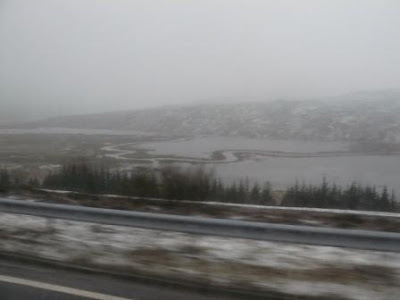 Poate că ultima oară când am scris pe această temă am lăsat impresia că sunt o vulpe din aceea ce nu ajunge la struguri şi am ceva cu aceşti corporate people.
Poate că ultima oară când am scris pe această temă am lăsat impresia că sunt o vulpe din aceea ce nu ajunge la struguri şi am ceva cu aceşti corporate people.Deşi nu am de ce să-i invidiez (căci, bieţii de ei, mulţi sunt ca nişte roboţi fără suflet de luni până vineri şi beţi ca nişte porci de vineri până duminică), revin şi din altă perspectivă.
De pildă, nu pot să nu admit că întreaga economie britanică prosperă*** de pe urma serviciilor financiare.
Nu, nu ţine de aroganţa britanică (ci este realitatea crudă pentru orgoliul oricărei mari naţiuni europene!), a recunoaşte faptul că şi Bundesbank şi Banque de France şi European Central Bank au nevoie de serviciile City-ului fără de care ar fi efectiv handicapate în a accede la marile jocuri financiare mondiale.
În plus – dacă acum 15-20 de ani, City-ul era încă o relicvă a spiritului antreprenorial de secol 19 şi nu ajungeai broker de bursă sau asigurări, bancher ori expert contabil decât dacă veneai dintr-o familie de atare tradiţie burgheză – acum oricine, din orice ţară a lumii, poate căpăta un job aici.
Sunt peste 500 bănci în City şi Docklands plus multe alte instituţii financiare (companii de asigurări, consultanţă, contabilitate, fonduri de investiţii, intermedieri în afaceri de miliarde euro etc), încât mi-e greu să cred că cine este într-adevăr bun în domeniu nu ar putea reuşi să-şi găsească de lucru dacă este priceput în domeniu, fie şi fără să fi absolvit o facultate de profil în UK.
Iar asta exclusiv pe baza meritelor sale, căci UK este percepută a fi o ţară coruptă doar în proporţie de 14 la sută. Aşadar, aş oferi sfatul nepatriotic ca nimeni să nu-şi mai piardă vremea în sistemul bancar românesc, dacă poate veni la Londra.
Desigur că, pe lângă a suporta mersul cu metroul, se mai cere ceva – să mai laşi la o parte din metehnele multor români convinşi că fără pile nu se poate. Ba se poate!
Din umilul meu contact cu lumea asta (doar am studiat European Political Economy la SEI şi am avut zeci de întâlniri cu responsabili din departamentele din subordinea premierului Gordon Brown, din Foreign Office, HM Treasury, think-tanks, the City of London, Scottish Gov, universităţi din Anglia şi Scoţia etc) am constatat că, oricâte cusururi s-ar putea găsi acestei ţări, în linii mari, este într-adevăr o meritocraţie.
 O avea bube şi sistemul acesta (vezi critici vizavi de varianta americană aici, aici şi aici), dar, în orice caz, pare mai bun decât ce am avut în România şi înainte, şi după 1989.
O avea bube şi sistemul acesta (vezi critici vizavi de varianta americană aici, aici şi aici), dar, în orice caz, pare mai bun decât ce am avut în România şi înainte, şi după 1989.Apoi, dintre toate simpaticele studente cu care am vorbit pe aici (că rareori intru eu în vorbă cu cineva de parte bărbătească, doar dacă-i musai :-), niciuna nu părea descurajată de sistemul deja clasicizat în UK de accedere într-o profesie (prin găsirea, uneori cu 6-12 luni înainte de absolvire, a un stagiu de practică la o firmă renumită; cu depus răbdător multe CV-uri; cu dat interviuri şi concursuri).
Câţi dintre studenţii din România ar putea să-mi de aceeaşi impresie, câţi poartă în ei convingerea că sistemul funcţionează?!
Şi la profesori, şi la studenţi am observat o anumită convingere plină de relaxare că, odată ce ai terminat o facultate în UK, automat ai devenit parte a unei elite, că efortul tău intelectual îşi va găsi răsplata cuvenită, mai devreme sau mai târziu.
Mă rog, City-ul poate ţine de mai devreme, căci este locul unde poţi fi propulsat mai rapid de la statutul de student amărât la cel de expert financiar, fie el şi junior.
Pur şi simplu, în UK nu am văzut atotprezenţa contramodelului şmenarului, bişniţarului, şmecherului de orice fel, al manelistului, al baronului local şi al beizadelelor sale etc, care să îţi vâre mereu degetul în ochi cu opulenţa şi nesimţirea lor.
Şi să te facă să nu uiţi vreo clipă că ei o să fie mereu peste tine, deşi tu nu vrei defel să fii ca ei, ci doar să fii lăsat a fi tu însuţi şi să-ţi fie respectată munca. Aşa ceva nu vezi în UK decât în presa bulevardieră, însă nu am resimţit apăsarea contraexemplelor menţionate la tot pasul, precum în România.
De aceea, pentru oamenii care nu-L au ca măsură a tuturor lucrurilor pe Hristos (încât să nu pună atâta la inimă strâmbătatea lumii ăsteia şi toate lucrurile acestea trecătoare), UK pare o ţară mai normală decât România, iar readaptarea la atmosfera dâmboviţeană poate fi o experienţă greu de îndurat, poate precum sevrajul celor care vor să se lase de heroină.
Pe ceilalţi am să încerc, prin umilele mele păreri de pe acest blog, să-i încredinţez că, practic, o viaţă creştinească poţi avea şi muncind în UK, şi muncind în România. Pentru că acasă poate fi oriunde te poartă El, mai ales dacă ţii în suflet nădejdea că ACASA adevărată nu este nicăieri pe lumea asta...
*** NOTĂ: Ehei, ce repede a schimbat lucrurile criza financiară, dar ceea ce scriam era perfect valabil la momentul redactării acestei postări...
[Pentru toate episoadele din această serie şi toate postările de pe acest blog mergi la/For all the episodes of this series, and all the posts on this blog go to: Contents/Cuprins]













 Any attempt to describe life in the UK could no longer avoid saying something about the cars the Brits drive. Since I’m neither a fan of motor sports, nor a driving ace, I thought it would be better for me to show images of cars seen in Britain, and not comment too much on something I am not an expert at. However, I could dare drawing attention to what seemed to me worth sharing with others.
Any attempt to describe life in the UK could no longer avoid saying something about the cars the Brits drive. Since I’m neither a fan of motor sports, nor a driving ace, I thought it would be better for me to show images of cars seen in Britain, and not comment too much on something I am not an expert at. However, I could dare drawing attention to what seemed to me worth sharing with others.





















